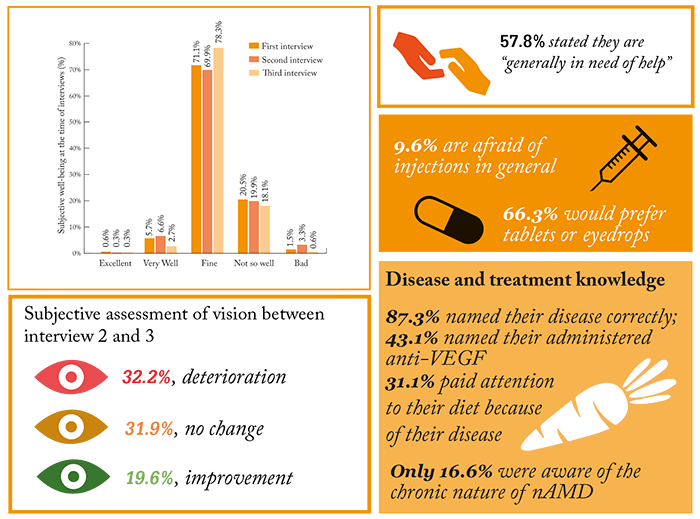
In the multicenter, non-interventional, prospective cohort study, a total of 332 patients with neovascular AMD were observed over a 12-month period; patients were over the age of 50 years and had received at least one intravitreal injection of anti-VEGF therapy prior to enrolment. Patients were enrolled from 23 different treatment centers, including hospitals, office practices and outpatient clinics.
Over the course of the study, patients participated in three 30 minute telephone interviews, each structured by a pre-defined questionnaire. The first interview (two months after enrollment) included assessments of patient well-being and their quality of life; the second (five to six months after enrollment) included assessments of knowledge, awareness and expectations of their disease and treatment; and the third (12 months after enrollment) questioned aspects such as beliefs, expectations and preferences. Key results are highlighted in the infographic (1). Based on the findings, the team were able to identify five significantly different clusters of patients:
- Cluster 1: optimistic patients without fear of injections or side effects, and a below average knowledge of their disease and treatment.
- Cluster 2: as Cluster 1 but with a better knowledge of their disease and treatment.
- Cluster 3: patients not afraid of injections or side effects, have good disease awareness and average knowledge of treatment, but are pessimistic with regards to expectations of therapy.
- Cluster 4: patients have “non-awareness” of disease, and do not use self-tests or pay attention to diet.
- Cluster 5: patients are afraid of injections and/or side effects.
Writing that patients differ in terms of treatment optimism, disease awareness and knowledge, and fear of injections or side effects, the team recommend “the development of separate patient communication strategies for the five patient clusters identified.” Coupled with the finding that only a minority of patients reported being aware of the chronic nature of neovascular AMD (16.6 percent), the team conclude that using communication strategies suited to individual patients might help motivate patients with neovascular AMD to accept the necessary long-term treatment for their condition.
References
- S Müller et al., “Treatment of age-related neovascular macular degeneration: the patient’s perspective”, Graefes Arch Clin Exp Ophthalmol, [Epub ahead of print], 2017. PMID: 28776095
